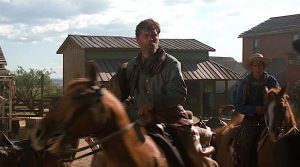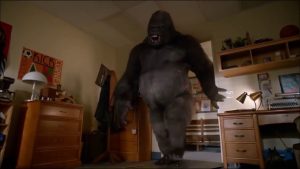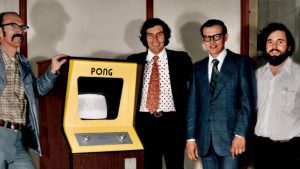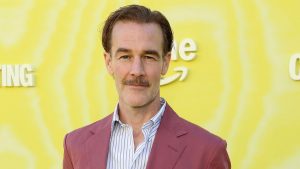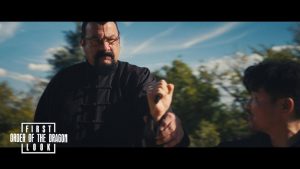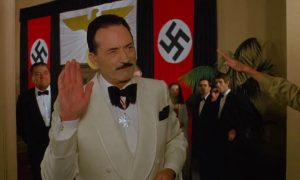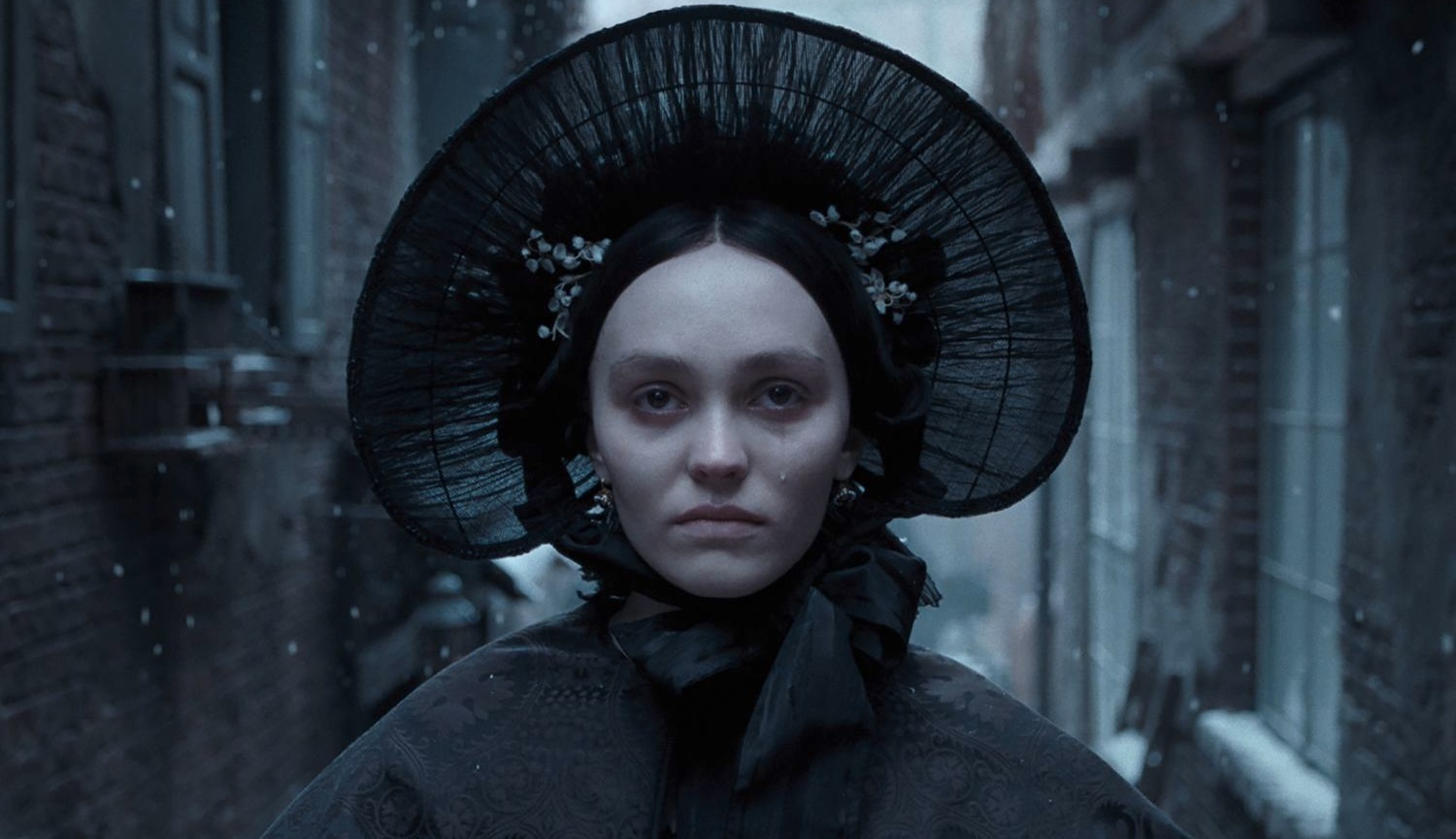
This article contains massive Nosferatu spoilers.
Judging by his filmography, it’s probably safe to say Robert Eggers is not strictly a religious man. His first film did, after all, end with a Puritan girl finding liberation from her Calvinist upbringing by selling her soul to the Devil and floating above a fire fed by the fat of her siblings’ flesh. And that’s the happiest finale thus far to an Eggers joint.
With those humble beginnings, the influence of religion, tradition, and magic would continue to course throughout all four of Eggers’ feature films to date, from his malevolent exploration of early modern anxieties about witchcraft (and independent women) to his jarringly alien and remote glimpse into the “Dark Ages,” a time when inhabitants of the British Isles were as likely to pray to Odin as Christ. These meditations weigh heavily, too, on Eggers’ newest film, Nosferatu.
Like the source material that inspired the 2024 film and its 1922 ancestor, Nosferatu is steeped in matters of faith and of what happens when the beliefs of the old world confront the new. Though antiquated now, such ideas presumably kept author Bram Stoker up at night. For what is the original Dracula novel if not a Victorian man channeling his anxieties about rituals, foreign “Eastern” influences on the culture, and even the sex lives of young women into a gripping adventure about the modern Englishman and his dutiful “New Woman” wife using science and modern Christianity to vanquish the ancient past?
But Nosferatu is not Dracula, and Robert Eggers is certainly not Bram Stoker. In fact, when we sat down with Eggers earlier this year to discuss his new movie, we pointed out that while Nosferatu is awash in Christian imagery, it is usually in relation to impotent attempts to control the monstrous evil represented by the film’s vampire, Count Orlok (Bill Skarsgård). Yes, Eggers also created a Van Helsing proxy, the newly named Professor Albin Eberhart Von Franz (Willem Dafoe), but this good doctor does not have the resolute confidence of Stoker’s Van Helsing, a doctor sure that his talents in medicine and the liberal arts could defeat the Undead. Conversely, Dafoe’s Von Franz is a raving alchemist.
“I make fun of that idea with some of the dialogue that Von Franz has,” Eggers told us when I asked if he saw his Nosferatu as at all related to Dracula’s metaphor about modernity versus the old world. “But is it a traditional good versus evil story? I don’t think so. I think it’s gray, and I think that that’s always more interesting…. [and Von Franz] uses more occult talismans in his possession [scenes] and not a cross. Even his Christian diatribes are a bit strange.”
It is of a piece with Eggers’ larger theme, which is not so much about defeating the forgotten past, but solemnly remembering it, paying it homage, and if need be, succumbing fully to its thrall.
A Priestess of Isis versus a Vampiric Magician
The scene which most encapsulates Eggers’ thesis is also perhaps the tenderest in his oeuvre. In the cold, sunless embrace of a winter morning where the snow wafts by like teardrops, all of the human characters have just left a cheerless funeral where two children and their mother were consigned to a mausoleum. Afterward Ellen Hutter (Lily-Rose Depp) realizes she must come to an understanding with her doctor.
Up to this point, Von Franz has been the closest thing Ellen’s known to a confidant in matters of the supernatural. Her husband Thomas (Nicholas Hoult) adores her, and she loves him, but even after coming face to face with “the Devil,” and feeling that demon sup from his breast, Tom remains hopelessly unable to understand the monster they must defeat—or for that matter why his wife would feel a physical draw to its presence.
She needn’t explain herself to Von Franz; he knows what it means to have a fascination with the dark. He also is the only person she can discuss with how to truly return to the light. Nonetheless, it’s only cold comfort he has to offer that morning. While Von Franz has read of varying customs for killing vampires, in Eggers’ script this variety of solutions confirms their impotency. The only method Von Franz gives credence to is one hidden away in the journals of Orlok’s willing disciple: black magic practitioner Herr Knock (Simon McBurney) and his account of a young woman being so comely (and willing) before a vampire that the nosferatu ignored its own self-preservation and drank from her until the “first crow of cock” and the rising of the sun.
For the record, this is more or less the fateful epiphany in F.W. Murnau’s original 1922 Nosferatu. Like Von Franz, the silent movie’s Ellen reads about how a woman must offer herself to a vampire should the plague and pestilence of the Undead be defeated. In this way, Nosferatu was always a more fatalistic and despairing tale than Dracula, perhaps befitting a film made by World War I veterans instead of a comfortable Victorian stage manager who dabbled in his free time with fiction-writing.
It also plays into Eggers’ natural instincts as a storyteller. All four of his movies have a sense of inescapable doom, although in the case of Nosferatu (2024), there is a newfound sympathy and warmth to this plight, separating it from even the 1922 film. Dafoe’s Von Franz expresses genuine sorrow and empathy for Ellen, suggesting that in another world, back in “pagan times,” she might’ve been revered as a Priestess of Isis. Alas in 1838 Germany, she is consigned to corsets, suspicion, and finally sacrifice.
Eggers frames the 19th century bonnet around Depp’s face as if it were a halo whose beneficence might choke her. But the face still shows acceptance and even a serene comfort in Von Franz’s kind whispers of oblivion.
It is informed by a movie which heightens Ellen’s sacrifice into a larger narrative about foregoing the certainty of modernity in favor of the obscurity of a past we can never fully comprehend. While snatches of dialogue inform us of what Orlok once was in this story, with a nun telling Thomas the vampire was a powerful sorcerer, we are never given the full picture of how Orlok became a ghoul. There is no flashback or humanizing backstory like in Francis Ford Coppola’s Bram Stoker’s Dracula, nor a vivid monologue painting a portrait of his life before, which is pretty much the first two volumes of Anne Rice’s Vampire Chronicles.
Eggers’ Orlok is a sinister presence who clearly was at some moment in history man, but the deals he made or magic he used to cheat the grave are as esoteric as exactly what was on that sheet of paper that poor Thomas signed when he thought he was just selling real estate. Instead he sold his marriage, and perhaps more, to a wraith of the old world for a sack of gold. The devil is in the details, but while Eggers and his production designer seem to implicitly know them, we like Ellen and Von Franz are left to form educated guesses. The film never even once explains Von Franz’s preferred emblem, the Fourth Pentacle of Mercury in The Key of Solomon the King (a 15th century Renaissance spellbook), is a really talisman really used to seek hidden things and control spirits.
But even if Von Franz and Ellen amount to occultist amateurs blundering in the dark, at least they try to better understand the metaphysical world around them. Other characters, those who most represent modernity like the preening and affected Harding (Aaron Taylor-Johnson), are left completely defenseless in the face of ancient truths we allowed to vanish down our collective memory hole. And woe unto ye who is too afraid to go looking into that abyss for answers.
Witches, Gods, and North Folk
Nosferatu might have the gentlest expression of this theme, with Ellen’s tragic fate being grieved via handfuls of lilacs sprinkled across the remains of her, and her demon lover’s, bodies. But it remains of a piece with Anya Taylor-Joy’s Thomasin accepting she’ll never be one of the Puritans’ “elect” few to see Heaven, so she instead takes the Devil up on a more earthly and immediate satisfaction in the here and now; it also is reminiscent of a crazed Wickie (Robert Pattinson) confronting some unknowable truth in a lighthouse that renders him fated to perhaps forever be fed upon by a seabird who picks at his liver, as if this is a nautical echo of the the titan Prometheus’ fate in Greek mythology; and of course Amleth (Alexander Skarsgård) was nothing if not a Viking thrilled to embrace his doomed destiny so long as his death came with his enemy’s severed head in his hand.
In all of Eggers’ movies, the metaphysical world exists exactly how the characters of its setting imagine it does. In the case of The Witch, the Devil walks among them in the shape of a goat or rabbit, here to inflict trauma and spiritual suffering; in The Lighthouse, a seabird really holds the soul of a sailor lost at sea… perhaps even that of the sailor Thomas Wake (Dafoe), the elder Wickie who also at times resembles Poseidon in the mind’s eye of his guilt-ridden assistant; and in The Northman, we’re led to believe that Viking Amleth can really see his unborn children in the womb of witchy lover Olga (Taylor-Joy), a young woman who one might call a white witch given her confidence in using magic to free herself. She certainly seems capable of calling forth a mighty wind when her ship needs it.
Nosferatu is slightly different in this regard since none of the characters have the expertise to fully know what they’re dealing with in Orlok, or how best to confront him. In fact, there is something pathetic about Dafoe’s warm Von Franz accepting there is no way to save the living except by sacrificing his ideal priestess. Nonetheless, these are all stories where magic exists, and the best way to survive it is to rekindle our covenant with it.
Years ago, Eggers told me that he had Jungian leanings and that he muses “these bits and bobs of the past are knocking around in everyone’s heads to some degree.” If that’s true, his films exist as an exercise in jiggling those bits to the forefront of our collective subconscious—bits and scraps about witches and vampires, as well as spiritual truths that the Cult of Isis spread across the entire length of the Nile and all the way into Rome and Ancient Greece. To this day, folks really do worship Isis—perhaps unwittingly preparing themselves for the return of Nosferatu’s plague.
Old Magic in New Robert Eggers Movies Yet to Come
While preparing for this article, Eggers teased out to IndieWire a few of the projects that he is at least hoping to work on next. One is the cryptically titled The Knight, a film described as a medieval period piece and which has sat on “a shelf with a lot of screenplays.” As Eggers pointed out, there were several times when Nosferatu was supposed to happen but didn’t in the last decade. These days he likes to have “five things going on, because you never know what’s going to work, what’s going to appeal to people, what’s going to be greenlit.”
Be that as it may, the concept of exploring medieval Christianity in a movie titled The Knight could end up playing just as foreign and alien as the paganism in The Northman or Professor Von Franz’s personal library. Consider the stories of St. Francis of Assisi who allegedly was pierced by the same lance that bled Christ on the crucifix after a six-winged angel approached the holy man in 1224. There are similar tales of convents and religious orders where folks were convinced they loved Christ, in the literal flesh, or for that matter turned into wolves because of opposing influences.
There were also knights with their own codas and customs which were more than a bit removed from what modern interpretations of King Arthur’s court would lead you to believe.
And of course there are other films and worlds Eggers could explore. Personally, we wouldn’t mind if he went back to his Nosferatu line about “pagan times” with their cults of Isis and everything else, be it Roman, Greek, or Egyptian (the latter of which Hollywood has barely visited). It would seem the sword and sandals movies are back, and the idea of the director of The Northman playing in what has become almost wholly Ridley Scott’s purview could prove to be a religious experience—pagan or otherwise.
Nosferatu is in theaters now.
The post Nosferatu and the Role of Paganism in Robert Eggers Movies appeared first on Den of Geek.

